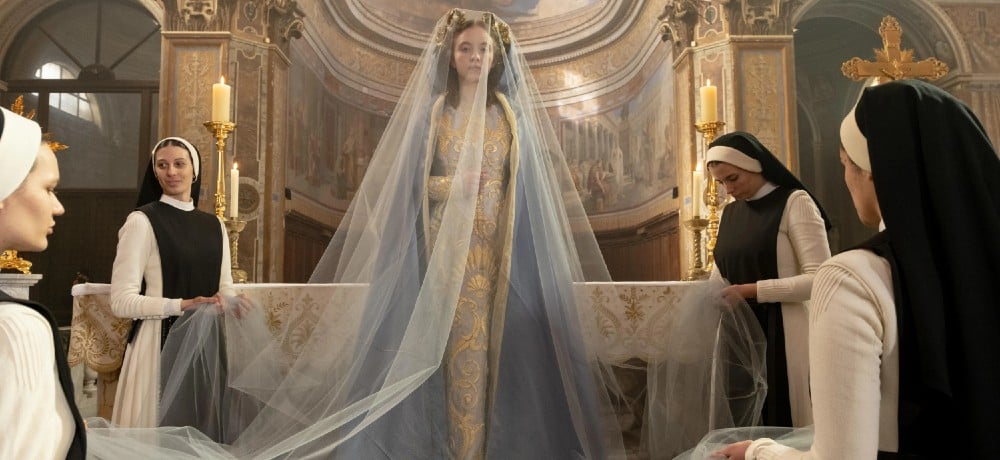


You’d be absolved for thinking that Immaculate – Michael Mohan’s buzzy new religious horror film about a young American novitiate (Sydney Sweeney) discovering pure evil in a secluded Italian convent – might shape up to be something classier than it is. True, nunsploitation is one of cinema’s most disreputable genres, but for every Killer Nun or Nun II there’s a The Devils or Benedetta: cloistered entertainments that have weightier themes to go with all the cross-humping blasphemy. God only knows what drove Sweeney to resurrect the project she auditioned for ten years prior, because Immaculate is a mostly silly genre affair with an ending that edges the film painfully close to something more divine.
Sweeney stars as Cecilia, who arrives at the convent where she will take her vows armed only with an Italian phrasebook and a pretty face that the other sisters (and immigration agents) can’t stop commenting on. Having lost her previous post outside of Detroit in the states, Cecilia is eager to make a new start and begin her life as a faithful servant of Christ, but there’s something off-putting about her new digs, where aged, dementia-suffering elderly sisters are sent to live out their final years and death is as common as doing the laundry. Cecilia quickly takes to the convent’s handsome head priest (Álvaro Morte) who also becomes her biggest acolyte when she is suddenly found to be pregnant in an apparent miraculous, virgin birth. But all is not as pure as it may seem, and Cecilia is soon uncertain whether the life she’s carrying inside her is a blessing from above or a curse from below.
Immaculate is rooted in strong visual nods and rich production design recalling religious horror past. It’s easy to see the influence of Italian exploitation, Mario Baino’s Dark Waters, Powell and Pressburger’s Black Narcissus, or even a bit of Pier Paolo Pasolini running through the film’s more aesthetically pleasing presentational elements. It all looks great but Lobel’s much heralded script holds things back, gesturing towards deeper themes - from bodily autonomy to sexual violence and, naturally, religious hypocrisy – that the film leaves puny and underdeveloped. The big reveal of just what’s going on in the convent is patently schlocky stuff, out-of-step with whatever grand thematics are in its empty, wimpled head, and the entire endeavor is paced with such a lack of care that it all comes off feeling like a pale wash than the detailed, awe-striking fresco it’s intended to be. Immaculate’s final two minutes are easily some of the most strikingly directed and acted the genre will see this year, but there’s a strange disconnect between the rote genre theatrics of the near hour and half preceding them and the provocative note audiences are left with.
Ultimately, Immaculate’s deadliest sin is that it lets down Sweeney, who goes for the gusto in her every moment onscreen and will handily win over horror audiences unfamiliar with her recent work on HBO or romantic comedies. The fact that she picked the project out of the Hollywood dustbin, brought on some of her most trusted collaborators, and served a very hands-on producing role is commendable, and she is truly blameless here: a Gen Z cinema saint, who by the sheer force of her faith in the work and underestimated talent, throws herself on the pyre and transcends Immaculate, briefly lifting it along with her.
Movie Score: 3/5